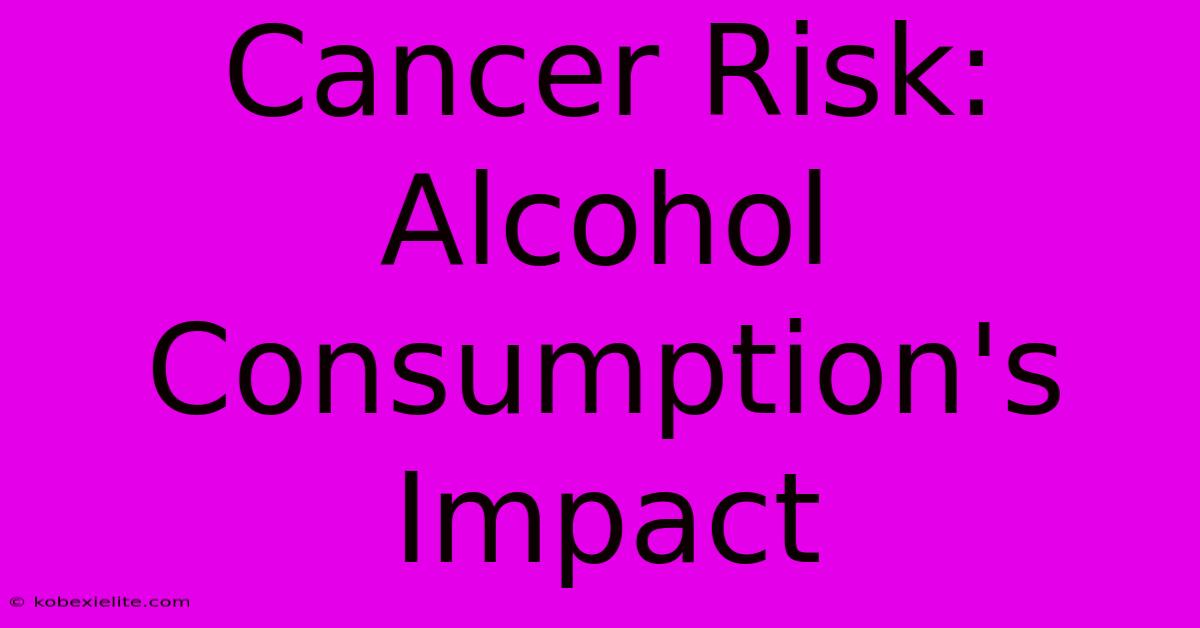Cancer Risk: Alcohol Consumption's Impact

Discover more detailed and exciting information on our website. Click the link below to start your adventure: Visit Best Website mr.cleine.com. Don't miss out!
Table of Contents
Cancer Risk: Alcohol Consumption's Impact
Alcohol consumption is a significant public health concern, linked to a multitude of diseases, including various cancers. While moderate drinking is sometimes touted as having potential health benefits (a notion increasingly challenged), the overwhelming scientific consensus points to a strong correlation between alcohol intake and an increased risk of several cancers. This article explores the relationship between alcohol consumption and cancer risk, examining the types of cancer affected, the mechanisms involved, and strategies for mitigating risk.
How Does Alcohol Increase Cancer Risk?
Alcohol's carcinogenic properties aren't fully understood, but several mechanisms contribute to its cancer-causing potential:
-
Acetaldehyde Production: The body metabolizes alcohol into acetaldehyde, a known carcinogen. This toxic substance damages DNA, increasing the risk of mutations that can lead to cancer. Individuals with genetic variations affecting alcohol metabolism may be at even higher risk.
-
Nutritional Deficiencies: Heavy alcohol consumption often disrupts nutrient absorption, leading to deficiencies in essential vitamins and minerals crucial for maintaining healthy cell function and DNA repair. This deficiency weakens the body's natural defenses against cancer development.
-
Immune System Suppression: Excessive alcohol use weakens the immune system, making the body less effective at identifying and eliminating cancerous cells. A compromised immune system allows pre-cancerous cells to proliferate, increasing the likelihood of tumor formation.
-
Hormonal Imbalances: Alcohol can disrupt hormone levels, especially in women. Changes in estrogen and other hormones can influence cell growth and division, increasing susceptibility to hormone-sensitive cancers like breast cancer.
-
Inflammation: Chronic alcohol consumption causes inflammation throughout the body. This persistent inflammation creates a conducive environment for cancer cell development and growth.
Types of Cancer Linked to Alcohol Consumption
Alcohol consumption is linked to a range of cancers, including:
-
Mouth and Throat Cancer (Oral and Pharyngeal Cancers): Alcohol's direct contact with the mucous membranes in the mouth and throat makes these areas particularly vulnerable. The combination of alcohol and tobacco use drastically increases this risk.
-
Esophageal Cancer: Alcohol is a significant risk factor for esophageal cancer, with heavy drinking increasing the risk substantially.
-
Liver Cancer: The liver is the primary site of alcohol metabolism, making it highly susceptible to alcohol-related damage. Chronic alcohol abuse leads to cirrhosis and an elevated risk of liver cancer (hepatocellular carcinoma).
-
Breast Cancer: For women, alcohol consumption is a leading preventable cause of breast cancer. Even moderate drinking increases the risk, although heavier drinking elevates it more significantly.
-
Colorectal Cancer: Emerging research suggests a clear association between alcohol consumption and an increased risk of colorectal cancer.
-
Other Cancers: Alcohol has also been linked to an increased risk of other cancers, including pancreatic cancer and stomach cancer.
Reducing Your Cancer Risk: Limiting Alcohol Intake
The most effective way to reduce your cancer risk associated with alcohol is to limit your consumption. Guidelines vary by region, but generally, recommendations suggest:
- Women: No more than one standard drink per day.
- Men: No more than two standard drinks per day.
It's crucial to understand that "moderate drinking" doesn't eliminate risk. Even moderate alcohol consumption increases cancer risk, albeit less significantly than heavy drinking. Abstinence is the safest option for minimizing cancer risk.
If you are concerned about your alcohol consumption and its impact on your health, it's crucial to discuss your habits with a healthcare professional. They can provide personalized advice and guidance based on your individual circumstances. They may also be able to offer support and resources for managing or reducing alcohol consumption.
Conclusion
The evidence overwhelmingly demonstrates a clear link between alcohol consumption and an increased risk of several cancers. While the exact mechanisms are still being investigated, the association is strong and consistent across numerous studies. By understanding the risks and making informed choices about alcohol intake, individuals can significantly reduce their chances of developing alcohol-related cancers and improve their overall health. Remember, consulting with healthcare providers is paramount for personalized advice and support.

Thank you for visiting our website wich cover about Cancer Risk: Alcohol Consumption's Impact. We hope the information provided has been useful to you. Feel free to contact us if you have any questions or need further assistance. See you next time and dont miss to bookmark.
Featured Posts
-
Lakers Win James 38 Points Dominate
Jan 04, 2025
-
Lakers Vs Hawks Nba Live Stream
Jan 04, 2025
-
Rivian Lower Output Higher Stock Price
Jan 04, 2025
-
How To Watch Lakers Vs Hawks Nba
Jan 04, 2025
-
Congresswoman Foxx Suffers Fall
Jan 04, 2025
